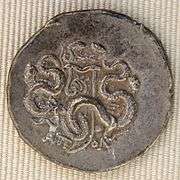Cistophorus

The cistophorus was a coin of ancient Pergamum. It was introduced sometime in the years 175-160 BC at that city to provide the Attalid kingdom with a substitute for Seleucid coins and the tetradrachms of Philetairos. It was also used by a number of other cities that were under Attalid control. It continued to be minted and circulated down to the time of Hadrian, long after the kingdom was bequeathed to Rome. It owes its name to a figure, on the obverse, of the sacred chest (Latin: cista) of Dionysus. It was tariffed at four drachmas, but weighed only as much as three Attic drachmas (the most important weight standard of the time), 12.75 grams. In addition, the evidence of hoards suggests that it did not travel outside the area which Pergamum controlled. It is therefore suspected that it was overvalued in this area.
External links
- Cistophorus, article in Smith's Dictionary of Greek and Roman Antiquities